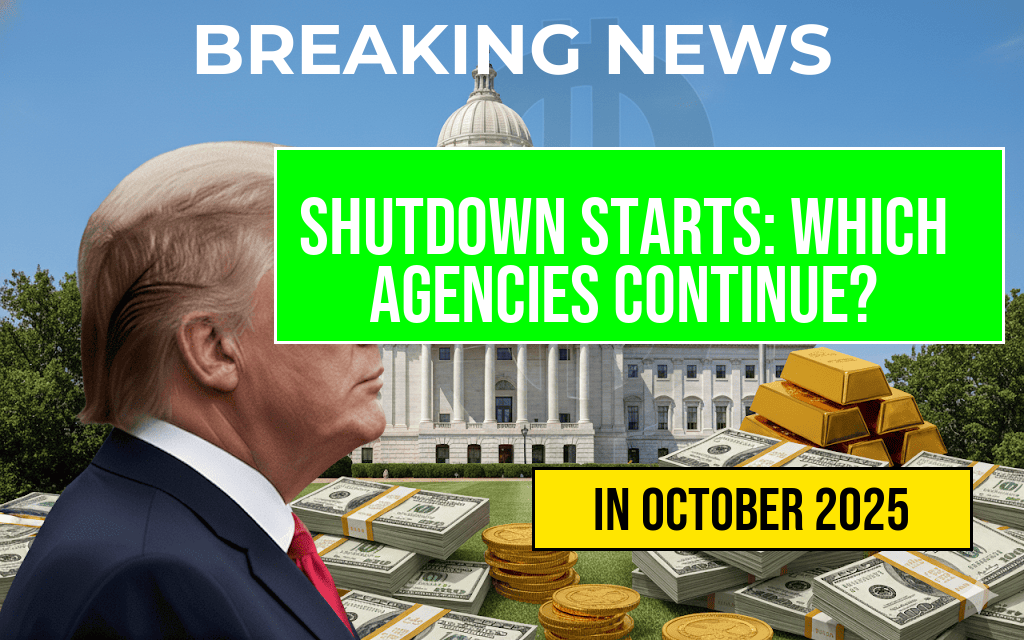The United States government has officially entered a partial shutdown following the failure of Congress to pass a funding bill before the deadline. This shutdown affects numerous federal agencies and programs, with some operations continuing under existing emergency funds or statutory provisions, while others halt all non-essential activities. Among the most impacted are vital services such as Social Security, the Internal Revenue Service (IRS), military operations, and transportation security managed by the Transportation Security Administration (TSA). The shutdown raises concerns about disruptions to public services, economic repercussions, and the well-being of millions of Americans relying on federal programs. While essential services remain operational, many federal employees face furloughs, and certain programs experience temporary suspensions, prompting questions about the duration and broader impact of this fiscal standstill.
Overview of the Shutdown’s Scope and Duration
The shutdown was triggered after Congress failed to pass a new appropriations bill or continuing resolution before the fiscal year deadline. According to official statements from the Office of Management and Budget (OMB), the immediate effects include the suspension of non-essential government activities, with federal agencies instructed to halt operations that are not deemed critical to public safety and national security. The duration remains uncertain, hinging on negotiations within Congress and the political climate surrounding budget priorities.
Agency-by-Agency Breakdown of Operations
| Agency | Status | Notes |
|---|---|---|
| Social Security Administration | Continuing Operations | Benefits are paid as scheduled; customer service centers open for urgent needs. |
| Internal Revenue Service (IRS) | Limited Operations | Tax processing continues for returns already filed; new audits and assistance are limited. |
| Department of Defense | Partial Operations | Military personnel on active duty continue working; civilian employees face furloughs. |
| Transportation Security Administration (TSA) | Operational | Security screenings at airports continue unabated to ensure travel safety. |
| Environmental Protection Agency (EPA) | Majority Closed | Most staff furloughed; essential environmental monitoring continues in limited capacity. |
| National Parks Service | Closed or Limited Access | Many parks are shuttered; visitors face closures or limited access. |
Key Services That Continue Despite the Shutdown
Social Security
The Social Security Administration remains operational to ensure beneficiaries continue receiving payments. Customer service centers are open for urgent inquiries, and online portals remain accessible for many routine functions. This continuity is crucial for millions of retirees, disabled individuals, and beneficiaries relying on timely payments.
Tax Processing and IRS Operations
The IRS continues processing tax returns already filed, with limited capacity to provide assistance or process new filings. Tax refunds scheduled for disbursement are expected to proceed as usual, but new audits and correspondence may face delays. The agency operates with a skeleton staff focused on critical functions, as outlined by the [IRS](https://www.irs.gov/newsroom/irs-statement-on-government-shutdown).
Transportation Security
The TSA maintains airport security screening operations, ensuring the safety of domestic and international flights. Travel disruptions are minimized, although other federal travel-related services might be reduced or temporarily unavailable.
Agencies Facing Significant Disruptions or Closures
Environmental and Natural Resources
The EPA has furloughed most employees, resulting in a halt to routine environmental monitoring, enforcement, and research. Limited emergency functions continue, but many environmental programs are paused until funding resumes.
National Parks and Museums
Many national parks, monuments, and museums are closed or operating with limited staff. Visitors face closures or reduced access, impacting tourism and local economies dependent on park visitation.
Other Federal Agencies
- Federal Emergency Management Agency (FEMA): Continues critical disaster response activities.
- Department of Education: Most programs and services are suspended, impacting student aid processing.
- Federal Courts: Most proceedings are delayed, though urgent cases proceed.
Implications for Public and Economic Stability
The shutdown’s immediate effects ripple across the economy, affecting federal contractors, small businesses dependent on government contracts, and federal employees facing unpaid leave. Market volatility has increased amid concerns about prolonged fiscal impasses, with analysts warning of potential setbacks in economic growth. Public confidence in government operations also faces strain as essential services like Social Security and TSA remain active, but many other functions grind to a halt.
Looking Ahead
As negotiations continue on Capitol Hill, the outlook remains uncertain. Lawmakers face pressure to reach a bipartisan agreement that funds the government and stabilizes fiscal policy. Until then, Americans are advised to prepare for potential disruptions in federal services and to stay informed through official channels.
Frequently Asked Questions
What agencies continue to operate during the government shutdown?
Many essential agencies such as the Social Security Administration, Internal Revenue Service (IRS), Defense Department, and Transportation Security Administration (TSA) are authorized to keep operating during the shutdown to ensure critical services and national security are maintained.
Which government services are most likely to be affected by the shutdown?
Non-essential services, including some public health programs, government grants, and certain administrative functions, may be temporarily halted or delayed during the shutdown, affecting various public programs and agencies.
Will Social Security benefits be affected during the shutdown?
No, Social Security benefits will continue to be paid as usual during the shutdown, since the Social Security Administration is classified as an essential service and is authorized to operate without interruption.
How does a government shutdown impact the IRS and tax-related services?
The Internal Revenue Service (IRS) may experience delays in processing refunds, answering taxpayer inquiries, and handling certain administrative functions, although key operations like tax collection typically continue to some extent.
What should travelers expect at TSA checkpoints during a shutdown?
During a government shutdown, the Transportation Security Administration (TSA) continues to operate at airports to ensure passenger safety, so travelers should expect regular security screening procedures to remain in place.







